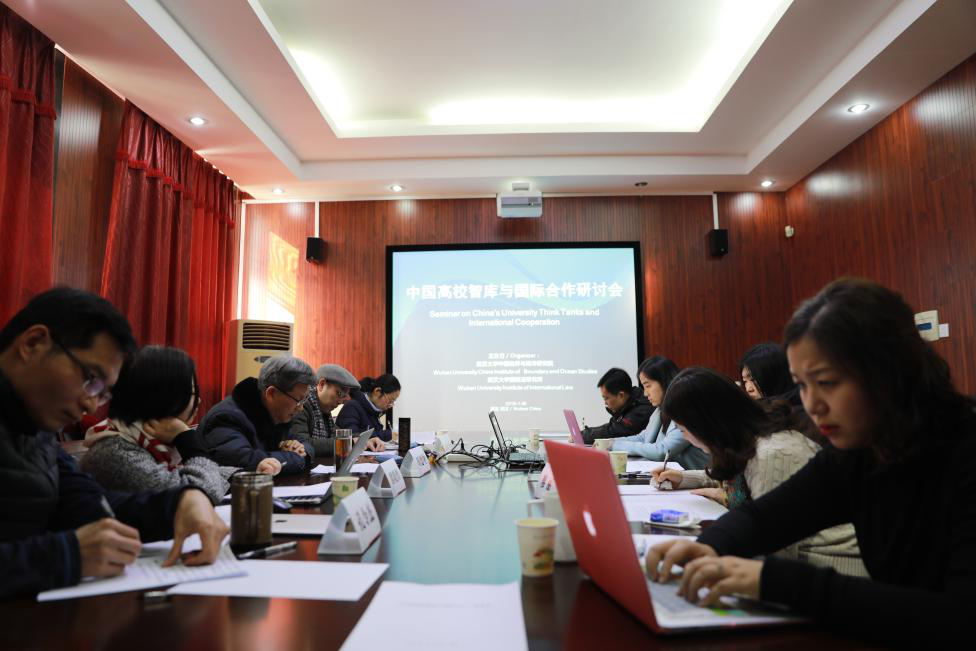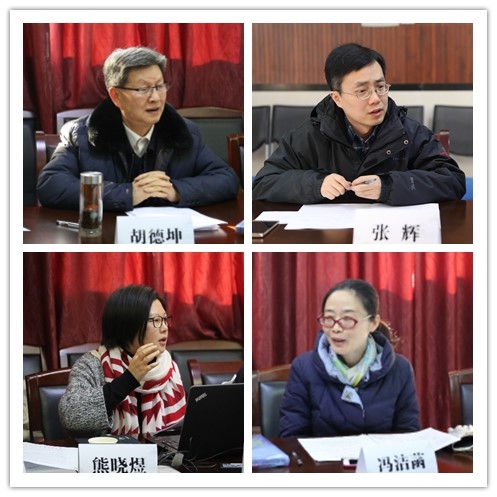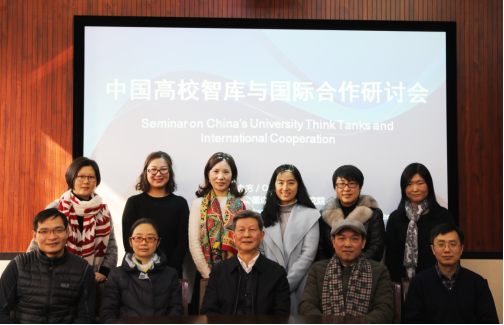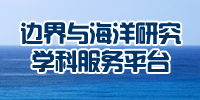- 武汉大学中国边界与海洋研究院2026年博士研究生综…
- 中国边界与海洋研究院2026年博士研究生招生综合考…
- 中国边界与海洋研究院 2026年招收攻读博士学位研究…
- 博士研究生学位论文答辩公告
- 武汉大学中国边界与海洋研究院2026年接收推免生预…
- 武汉大学中国边界与海洋研究院2026年推免生预报名…
- 第八届“边界与海洋研究”博士生论坛(一号通知)
- 志愿者招募 | 2025 年中国国际法学会第六期暑期国…
- 【公示】2025年武汉大学博士研究生申请短期出访与…
- 武汉大学中国边界与海洋研究院招聘启事
- 武汉大学中国边界与海洋研究院2025年博士研究生拟…
- 中国边界与海洋研究院2025年硕士研究生调剂复试拟…
- 中国边界与海洋研究院2025年上半年博士生延期资助…
- 中国边界与海洋研究院2025年硕士研究生调剂复试名…
- 武汉大学中国边界与海洋研究院2025年硕士研究生调…
- 中国边界与海洋研究院2025年硕士统考拟录取名单公…
Seminar on China’s University Think Tanks and International Cooperation was Successfully Held
On the 30th January 2018, a seminar on China’s University Think Tanks and International Cooperation was successfully held at Wuhan University. This event serves as part of the Global Go To Think Tank Index Report Launch and Why Think Tanks Matter events, launched by Think Tanks and Civil Societies Program at University of Pennsylvania. It was jointly sponsored by China Institute of Boundary and Ocean Studies and the Institute of International Law of Wuhan University, both of which are listed by relevant department in China as leading national think tanks. Deans and research fellows of the two institutes and heads of the University department in charge of think tanks programs were present at the Seminar.
The Seminar was held with an aim to gain a better understanding of the role of University think tanks in promoting China’s international cooperation. Main topics include:
The role of university think tanks in promoting the settlement of territorial, boundaries and maritime disputes;
The role of university think tanks in promoting China's participation in international rule of law;
The role of university think tanks in promoting international cooperation and global governance;
Internationalization and international cooperation of Chinese university think tanks.
Professor Dekun HU, funder and Chairman of the Board of Directors of China Institute of Boundary and Ocean Studies, delivered a keynote presentation. He briefed his visit to TTCSP at University of Pennsylvania and his meeting with Director James G. McGann. He moved on to development of think tanks in China, those of universities in particular. President XI Jinping in his speech given in October 2017, called for a step up in the development of professional, influential and internationally recognized national think tanks. In 2015, the International Law Institute of Wuhan University was nominated as a national top think tank. In 2017, China Institute of Boundary and Ocean Studies and China Institute of South China Sea Studies in Haikou were listed as national top think tank. However, think tanks in Chinese universities need to sort out the following matters for further development. First, in contrast to think tanks affiliated with the government, e.g., China Social Science Academy, China Institute of International Studies, most think tanks in university are small in scale. Second, many university think tanks are not closely connected to relevant governmental departments. Third, most think tanks are not multi-diciplinary. Fourth, a proper evaluation system has not been set into place. Fifth, the level international cooperation and collaboration should be elevated. Based on the above observations, he put forward the following recommendations. First, a professional think should have around 100 full-time research fellows. CIBOS now have about 30. It is recruiting senior and young research fellows, both at home and from abroad. Second, each university think tank should have its own specialty and priorities. CIBOS focus on territorial, international boundary and maritime issues. Third, the Ministry of Education and universities should safeguard sustainable development of the think tanks, giving them proper discretion in human resources, finance and running of the think tank. Fourth, university think tanks in China need to step up the pace of internationalization.
Professor Hui Zhang, Deputy Director of Wuhan University Institute of International Law, noted that although think tanks in universities lags behind those affiliated by ministries, they have advantages. Relying upon a university, this sort of think tanks has a solid multi-disciplinary background. For instance, supported by Wuhan University, a university with a top ranking and world-class subjects, think tanks in Wuhan University can provide comprehensive and multi-disciplinary consultation. Furthermore, Professor Zhang analyzed challenges that university think tanks are facing from institutional and individual levels. First, current mechanism of colleges and universities impedes consolidation of resources. Faculties are bounded by separate colleges and are lack of mobility; therefore, it is difficult to develop an issue-oriented, task-driven and cooperative mechanism for university think tanks. Second, university as an education and research entity requires its faculties to concentrate on teaching and academic research. Adding consultation work makes faculties feel overburdened and difficult to balance among teaching, reasearch and consultation. To make Chinese think tanks become globally recognized, we should understand international criteria of assessing think tanks and standards of world most renowned think tanks. In addition, Professor Zhang believes that in order to make our think tanks go global, we need to exert more efforts on making our publications available to the public and diversifying our publications.
Professor Xiaoyu Xiong, Vice Dean of Wuhan University China Institute of Boundary and Ocean Studies, identified the main features of western think tanks by observing and analyzing the most famous western think tanks, especially those in the United States. First, think tanks are integral parts of the western political and economic system. Second, think tanks serve the interests of the funders and represent the opinions of the mainstream elites. Third, stable administrative teams and mobile research teams work together. Fourth, creating a think tank report brand with a sustainable impact is important. Based on the analysis of western think tanks, Prof. Xiong believed that universities should use their own unique advantages to establish a new type of think tanks with Chinese characteristics and within the Chinese context, in line with the overall national objectives and requirements for high-level think tanks. The establishment of such a new type of think tanks with Chinese characteristics should embody the following characteristics: first, serving for domestic and international decision-making and playing an active role in forming societal consensus; second, striving to break disciplinary boundaries and aim at solving problems; third, utilizing higher education institutions' strengths in cultivating talents and convert think tanks into a talent pool; fourth, making think tanks-specialized knowledge resource bases; fifth, making think tanks in universities a platform to expand China's international influence.
Prof. Jiehan Feng, Deputy Director of Wuhan University Institute of International Law, analyzed the current situation and issues of Chinese think tanks' participation in the construction of the African legal system. She pointed out several difficulties in this collaboration: first, the frequent alternations of political powers in Africa weakened the construction of the legal system and hindered sustainable collaboration; second, institutional problems prevent China from having an integrated team that specialized in African studies. Although there are several universities in China that have research centers of African studies, since they are separate institutions, resources are scattered and hard to integrate. Prof. Feng observed that currently, cooperation between Chinese think tanks and African’s are mostly based in China. Academic conferences and governmental events are rarely held in Africa. Prof. Feng noted that in order to boost the international influence of Chinese think tanks, holding events aboard is a necessary step.
During the discussion section, experts and scholars had intensive discussions on relevant issues, solutions and future development directions of think tanks in universities. Scholars attended the seminar all exchanged their thoughts and concerns as participants of think tanks in universities and offered some suggestions for next steps.
In short, this seminar critically analyzed the current situation of Chinese think tanks in universities, examined in depth the opportunities and problems related to the establishment of Chinese think tanks, and put forward suggestions for advancing development of think tanks in universities and extending international outreach of Chinese think tanks.
(written by Prof. Dr. Lingjie Kong, Vice Dean of CIBOS; Dr. Fang Yuanyuan, post-doc fellow of CIBOS.)
1月30号上午,“中国高校智库与国际合作”座谈会在我院举办。本次会议由武汉大学中国边界与海洋研究院和国际法所主办,就四个重要议题“关于中国高校国际智库建设的若干思考”、“高校智库在中国国际法实践中的作用”、“理解西方智库特点,发挥高校智库优势”、“智库参与非洲法治化合作的几点思考”,深入探讨了中国高校智库在推动中国国际合作中的地位与作用。

座谈会现场
武汉大学人文社科资深教授、国家领土主权与海洋权益协同创新中心主任、武汉大学中国边界与海洋研究院理事长胡德坤教授作了主旨发言。他从高校智库的规模、机制、与国家需求的结合及国际化程度方面总结了目前国内高校智库建设存在的问题,并提出了针对性的建议:例如增大国家智库人员规模;以问题为导向,利用高校学科齐全的优势,依托跨学科的研究团队,开展综合研究;建立有优势有特色的智库;高校智库应积极参加国际智库的活动,参与并接受国际智库评价中心的评估,以评促建,通过评估找出问题,不断改进,促进发展。他提出,我们需要找到与国际一流智库的差距,改进工作,尽快让武汉大学智库走向世界,成为世界知名智库。
武汉大学国际法所副所长张辉教授就体制和个人两个角度分析了高校智库进一步发展的两大难点:一是目前高校机制有碍资源整合,高校各院系相对独立,很难转为以问题为导向、以任务为驱动、以研究为中心的合作机制;二是高校教师难以协调教学、科研、智库三大工作内容,因高校的功能是复合的,高校教师必须兼顾科研和教学,如何兼顾智库工作是一大难点。张辉教授认为,我们应该了解国际上对智库的评价标准,参照国际智库的标准去建设,才能实现与国际接轨的目标。

武汉大学中国边界与海洋研究院副院长熊晓煜基于对西方智库的分析,提出中国高校应该根据国家高端智库建设的总体目标与要求,结合高校自身的特点,建立符合中国国情的、具有中国特色的新型智库,旗帜鲜明地为国家利益服务,智打造具有持续影响力的品牌报告与成果等。同时她提出,高校智库要充分发挥自身学科丰富优势,但也要以问题为导向摆脱单一学科限制,以建设人才库、专业知识资源库为目标。
武汉大学国际法所副所长冯洁菡教授就高校智库参与非洲法治化建设合作谈了自己的几点思考,她认为目前智库参与非洲法治化合作的困哪主要表现在非洲地区政权交替频繁,法治建设不完善,以及中国高校体制问题使得研究分散。虽然目前中非目前已经开展了中非合作论坛、中非联合仲裁中心等合作,但在研究人员数量、在非洲当地开展合作方面还需要提高。

与会老师合影
座谈会上,边海院及国际法所的教师代表交流了自己对建设高校智库的感想与建议。座谈会的最后,余敏友教授对座谈会作了总结,他指出虽然高校还是以学院为单位开展教学科研,但是高校建设智库需要敢于迎接挑战,解放思想创造条件,以建设世界一流智库为目标不断奋斗。
(图文:付姗姗、秦泽昊、禤嘉慧)





